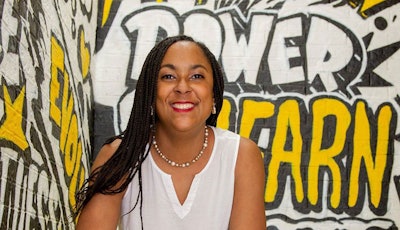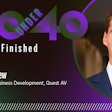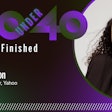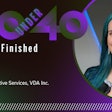
Like many event planners we talk with, Mahoganey Jones, CMP, DES, HMCC, did not plan to have a career in the events industry. Growing up, her goal was to be a doctor, specifically a kinesiologist. But her desired career and current career have found a way to intertwine. She plans medical and pharmaceutical conferences and events as the founder and principal planner of Event Specialists, an event production company that designs, manages and produces live and virtual events in Canada and the U.S.

In recent years, Jones says she’s grateful for the National Coalition of Black Meeting Professionals that brings together Black planners who have been in the industry for years. Before she met her peers from the coalition, the group most welcoming to her were the people who worked on the audiovisual side of the business, which is how she became such a tech whisper.
“I ended up being so connected to the AV guys because they were always the ones who welcomed me with open arms, more than the planners did when I started,” she said. “So, I began to pick up this different skillset in becoming an event producer and loving tech.”
Jones’ first taste of planning events was as a teenager volunteering at local hospitals in Canada and organizing events for them. When she entered college at Dalhousie University in Halifax, Nova Scotia, Canada, she continued working in events as a way to pay for school, not realizing it could be a career.
After earning her degree in kinesiology, she worked in a government job in disability management. Even in that role, she gravitated toward events. Finally, a mentor asked her, “Why don’t you do events if that’s what [you love] doing?” The position with the Canadian government had a year-long contract, and it recommended participants go into a program to help them start a business. Armed with the idea and advice from her mentor, and her passion for planning, Jones started her company, Event Specialists, in 2004.
Getting Started in the Industry
Ever-evolving, Jones received a wedding planning certificate while in her government role and became a certified wedding planner. Her first event was planning a wedding for one of her government clients. From there, she had a few serendipitous moments with business conferences and fundraisers that came her way.
As she continued in the events industry she faced different challenges, but the biggest one was being a novice.
“When I took my wedding planning course, it was all through correspondence at the time,” she said. “So, I still wasn’t entrenched and familiar with the events community. My biggest challenge was understanding what the landscape looked like for events.”
Many entrepreneurs would be nervous starting in the business and not being fully in tune with its challenges, but “young Mahoganey,” as Jones said, had no fear. To overcome the hurdles, she searched for providers for her brides and clients and learned the importance of having a contract. She met suppliers who said, “you know, you really need a contract” or “you should have a payment agreement.” Contracts and agreements are the first things you learn in hospitality 101, but when you’re new, you have to go through trial and error when starting a company.
Although Jones found suppliers were friendly and helpful, not many planners were the same. “There was one wedding planner, Claudia Habib, who always welcomed me with open arms to ask questions and to learn from her,” she said. “But for the most part, it felt like a very closed community and they didn’t want other event planners coming in.”
As a Black woman, Jones believes they were more threatened by the competition of someone new, as opposed to her race. However, she does admit she experienced a lack of respect and having to prepay for services and items versus other clients and planners who didn’t have to prepay. Or there was a time she learned that a contract was chosen by another company. “I always thought the contracts were rewarded to other companies because they had more experience,” she said, of her younger years. “But then I found out my proposal was the one that was executed but executed by a different company.”
“[I believe] a lot of it came down to me being female more than anything—and then being a young Black female running a business,” she said. “But I remember going into an event more times than once and the supplier not thinking I was the owner of the company and then actually not speaking to me.”
Welcome to the Meetings World
After years of planning dream wedding for couples, Jones said her own “I do” and left the wedding world behind in 2008 when she moved to Ottawa. She transitioned her businesses to the meetings industry. To stairstep into corporate and association planning, she continued to plan weddings while also getting her feet wet in planning business events and fundraisers. Once in Ottawa, she focused more on corporate events and was eventually introduced to associations and medical associations, which is her specialty now.
With so many event production companies in the industry, it can be easy for entrepreneurs to get lost in the mix, but Jones says she takes pride in her company being ahead of the curve. As companies now scramble to transition to virtual and hybrid events, Event Specialists has been producing hybrid events since 2008.
As a self-proclaimed tech whisperer, she believes in the power of event technology and that has always separated her from her competition. “I can speak both languages,” she said. “I don’t believe in choosing technology first, but I feel like you should lead with your purpose and then match the technology.”

As a Black woman in tech, she remembers industry colleagues playing into stereotypes and making such off-color remarks as “you’re Black so you must do Black weddings” or even “Black people don’t pay.” She said there were always microaggressions to deal with and feeling alone because there weren’t many Black planners. “The amount of times I would go somewhere and not see a Black face at an industry event…” she said. “It went on like that for years before I moved to Ontario.”
Jones is noticing a shift in the industry as it relates to the Black Lives Matter movement. From a diversity standpoint, the industry is more mindful and buying from more diverse companies than when she started out. Her phone is ringing more, but she’s not sure if she has fallen into the bucket of being a token Black planner. It is hard for her to say.
“I do feel like there is a stronger movement in paying attention to the Black professionals who are out there,” she says. “Many of us have been around for years, but are not getting the same access to these bigger contracts and opportunities like our white counterparts.”
Moving forward, she wants the industry to take note of credentials when booking a planner. Many Black professionals are certified, but not all are getting fairly looked at, she intimated. She’s been asked numerous times if she knows Black event producers or Black designers.
“We are more than diversity speakers and there are Black-owned event producers in all facets of the industry,” she said.



















